For sim racing enthusiasts seeking a stable and adjustable mounting solution without committing to a full cockpit, the Next Level Racing Wheel Stand 2.0 presents a compelling option. It is engineered to provide a rigid platform for a wide range of racing wheels and pedals while offering the significant advantage of a foldable design for easy storage. This article provides a detailed, objective analysis of its construction, features, performance, and overall utility for sim racers.
This review examines the stand’s technical specifications, build quality, ergonomic adjustments, and performance with various types of force-feedback wheels, from entry-level gear-driven models to more powerful direct drive wheels.
Next Level Racing Wheel Stand 2.0: Core Specifications
A glance at the technical data provides a clear overview of the stand’s capabilities and footprint. The use of carbon steel is central to its design, aiming to deliver stability that surpasses many entry-level stands.
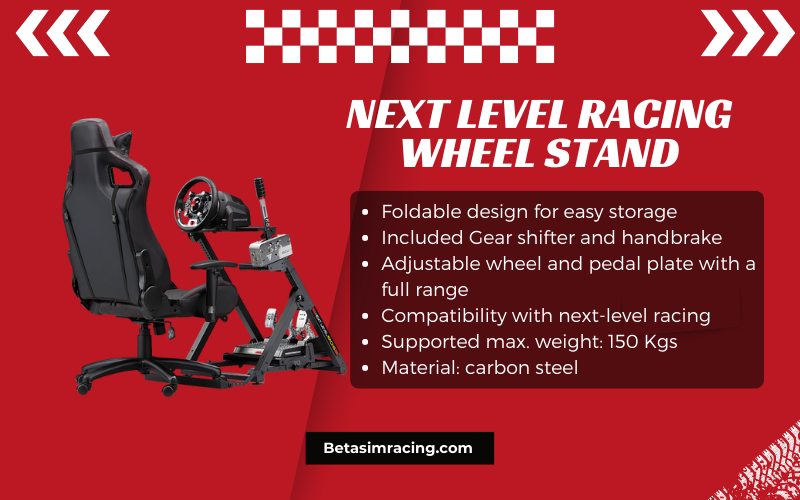
| Specification | Detail |
| Material | Robot-welded Carbon Steel |
| Finish | Matte Black Powder Coat |
| Product Weight | 48.5 lbs / 22 kg |
| Operational Dimensions | 36.4 in (L) x 22.6 in (W) x 30.9 in (H) / 92.5cm (L) x 57.5cm (W) x 78.5cm (H) |
| Folded Dimensions | 21.2 in (L) x 7.5 in (W) x 36.4 in (H) / 54cm (L) x 19cm (W) x 92.5cm (H) (Approximate) |
| Supported User Height | 4 ft – 7 ft / 120 cm – 210 cm |
| Wheel Plate Adjustability | Angle adjustment |
| Pedal Plate Adjustability | Angle adjustment (up to 18 degrees) |
| Included Mounts | Gear Shifter & Handbrake Plate |
| Key Compatibilities | Pre-drilled for Logitech, Thrustmaster, Fanatec |
| Upgrade Path | Compatible with Next Level Racing GTSeat Add-On |
Build Quality and Construction Analysis
The foundation of any reliable racing wheel stand is its build quality. The Wheel Stand 2.0 is designed to handle the intense forces generated during competitive sim racing games.
Materials and Manufacturing Process
The stand is constructed primarily from 40mm square carbon steel tubing with a 2mm wall thickness. This choice of material provides substantial weight and rigidity. The manufacturing process involves laser cutting and robotic welding, which ensures precision in its components and consistency in the strength of the joints.
Expert Insight: The use of robotic welding is a significant factor in the stand’s structural integrity. It creates clean, strong, and uniform welds, minimizing potential weak points that could lead to flex under the torque of a steering wheel or the pressure of heavy braking.
All metal components are finished with a matte black powder coating, which provides a durable and scratch-resistant surface that holds up well against the wear and tear of setup and storage.
Package Contents and Initial Inspection
The product is shipped disassembled. The box contains:
- The main frame components of the Wheel Stand 2.0
- Gear shifter and handbrake adapter plate
- Game Chair Cradle attachment
- All necessary M6 bolts, washers, and adjustment knobs
- Assembly tools
- An instruction manual
Upon inspection, the components are cleanly processed with no sharp edges or burrs. The included hardware is also finished in black to match the frame, contributing to a cohesive aesthetic.
Assembly and Setup
The assembly process is straightforward, guided by a point-by-point instruction manual. The tubular frame components are screwed together, creating the core structure.
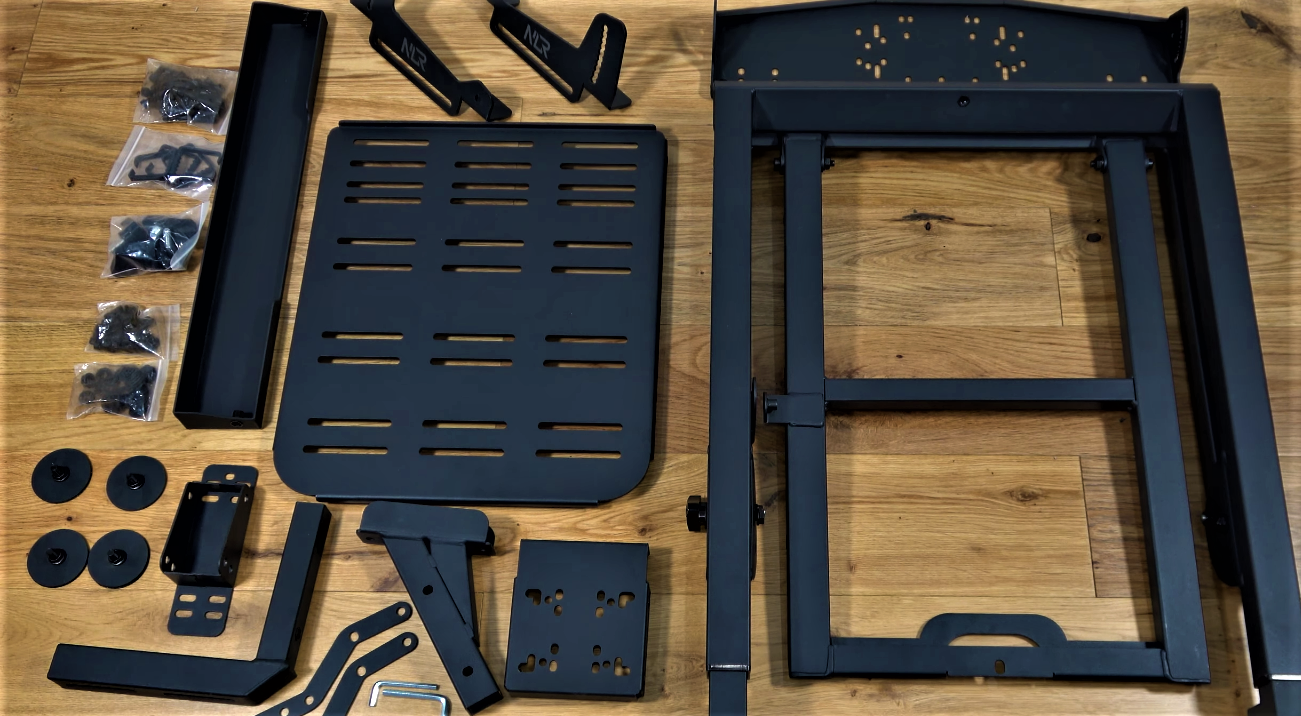
The Assembly Process
Assembling the stand involves connecting the main vertical and horizontal supports and attaching the wheel deck and pedal plate. The screws and fittings are heavily greased, which aids in a smooth assembly process and prevents thread stripping. The final assembled footprint is approximately 70 x 54 cm, not including peripherals mounted on the side.
Mounting Peripherals
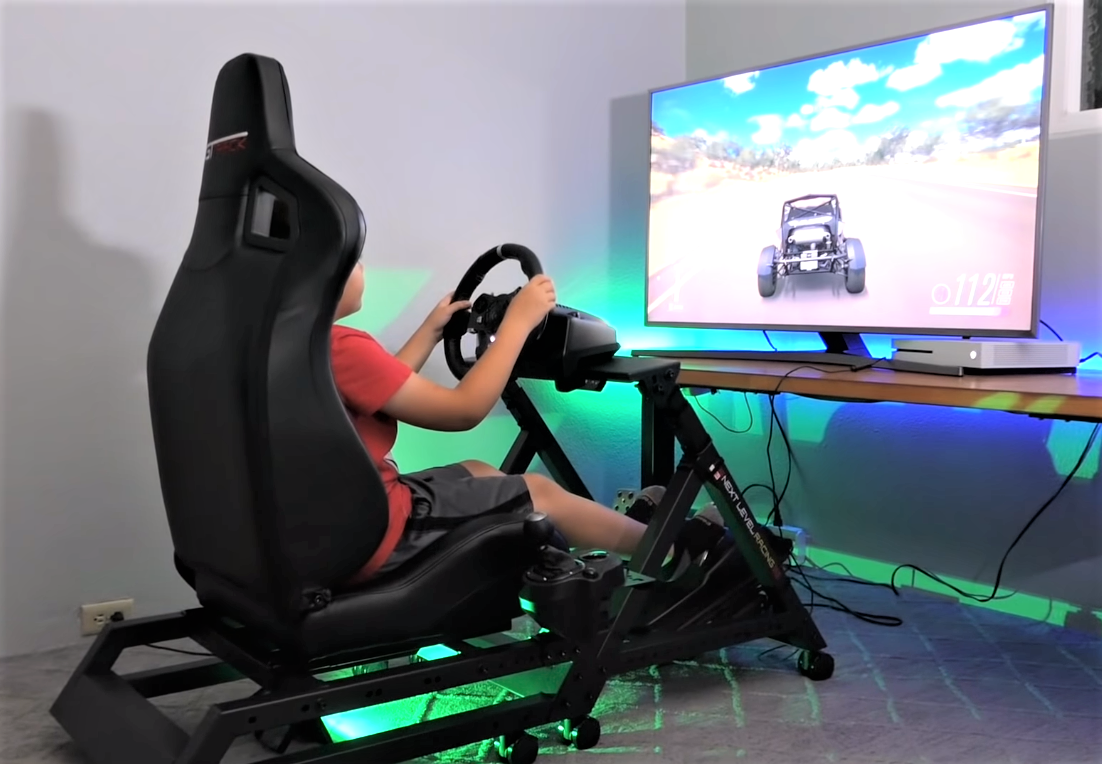
The wheel and pedal plates come pre-drilled to accommodate the mounting patterns of major manufacturers.
- Wheels: The wheel deck features multiple slots and holes, providing native support for models like the Logitech G920, Thrustmaster T248, and Fanatec CSL DD. The design allows the wheelbase to be secured firmly.
- Pedals: The pedal plate offers a similar array of mounting holes and slots, allowing for direct mounting of most pedal sets. The position can be adjusted forwards and backward to suit the user’s legroom requirements.
- Shifter/Handbrake: A dedicated plate is included that can be mounted on either the left or right side of the stand, providing a solid base for a sim racing shifter or handbrake.
Design, Adjustability, and Ergonomics
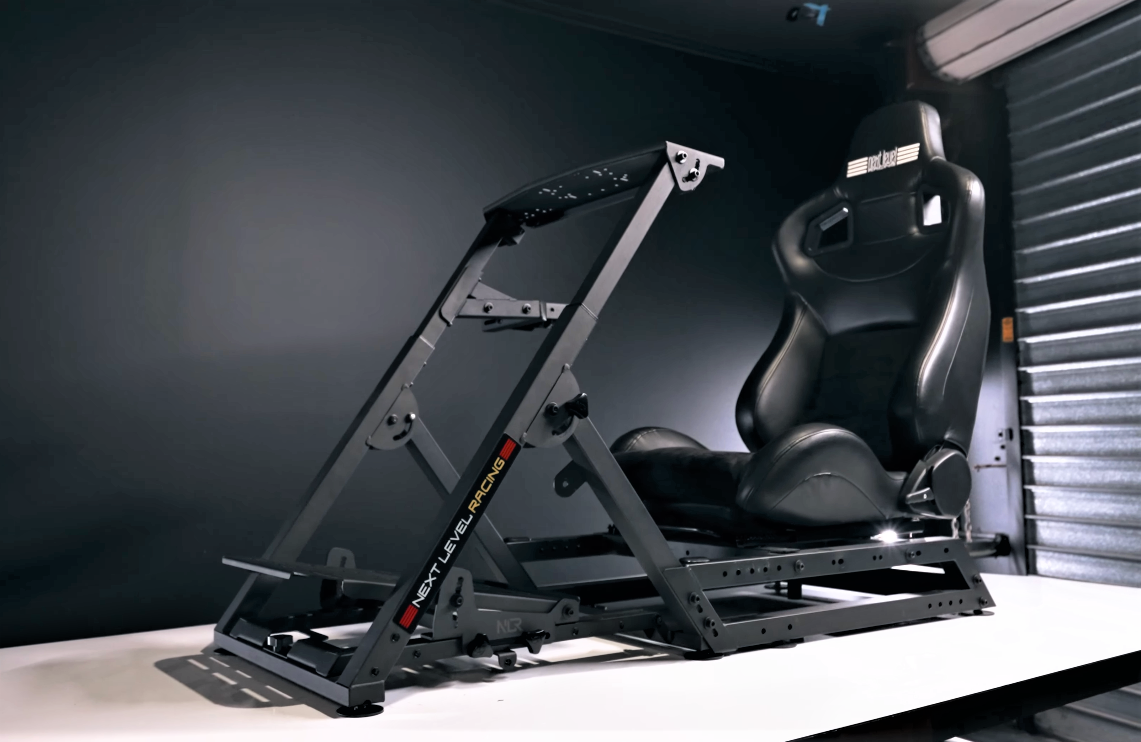
A key aspect of any sim racing setup guide is achieving proper ergonomics. The Wheel Stand 2.0 provides a high degree of adjustability to help users find a comfortable and effective driving position.
Wheel and Pedal Plate Adjustability
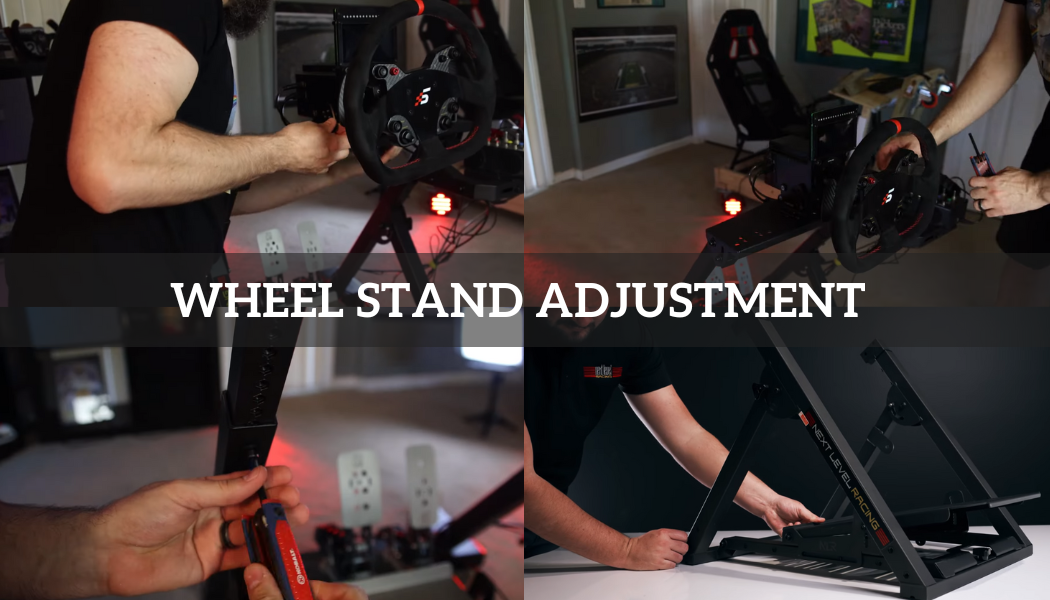
- Wheel Deck: The height of the wheel deck is adjustable along the main frame. The angle of the wheel plate can be tilted up to 30 degrees, allowing users to set a comfortable wrist angle, from a flat GT style to a more angled formula position. Adjustments are made quickly via side-mounted clamping knobs.
- Pedal Plate: The pedal plate’s angle can be adjusted up to 18 degrees. This is crucial for achieving a natural ankle and leg position, which is especially important for load cell pedals that require significant pressure.
Shifter and Handbrake Support
The included support plate for shifters and handbrakes is a significant feature. It can be height-adjusted and positioned on either the right or left side, catering to all users. This eliminates the need for a separate mounting solution, which is often an additional cost with other stands.
Stability Features: The Game Chair Cradle
One of the most common issues with wheel stands is the tendency for an office or gaming chair on wheels to roll backward during intense braking. The Wheel Stand 2.0 addresses this with an included Game Chair Cradle.
This simple but effective V-shaped tray sits on the floor, and the front two casters of the user’s chair are placed into it. This mechanically prevents the chair from moving away from the pedals, creating a more stable and unified system that mimics the fixed nature of a full sim racing cockpit.
Performance Under Load and Rigidity
The ultimate test of a wheel stand is its ability to remain stable under the forces of sim racing.
Performance with Entry-Level and Mid-Range Wheels
With gear or belt-driven wheels like the Logitech G-series (G920 vs G29) or the hybrid Thrustmaster T248, the Wheel Stand 2.0 is exceptionally solid. The carbon steel construction effectively dampens vibrations and exhibits minimal to no flex in the main column or wheel deck. The stand provides a completely rigid platform for wheels in this performance category.
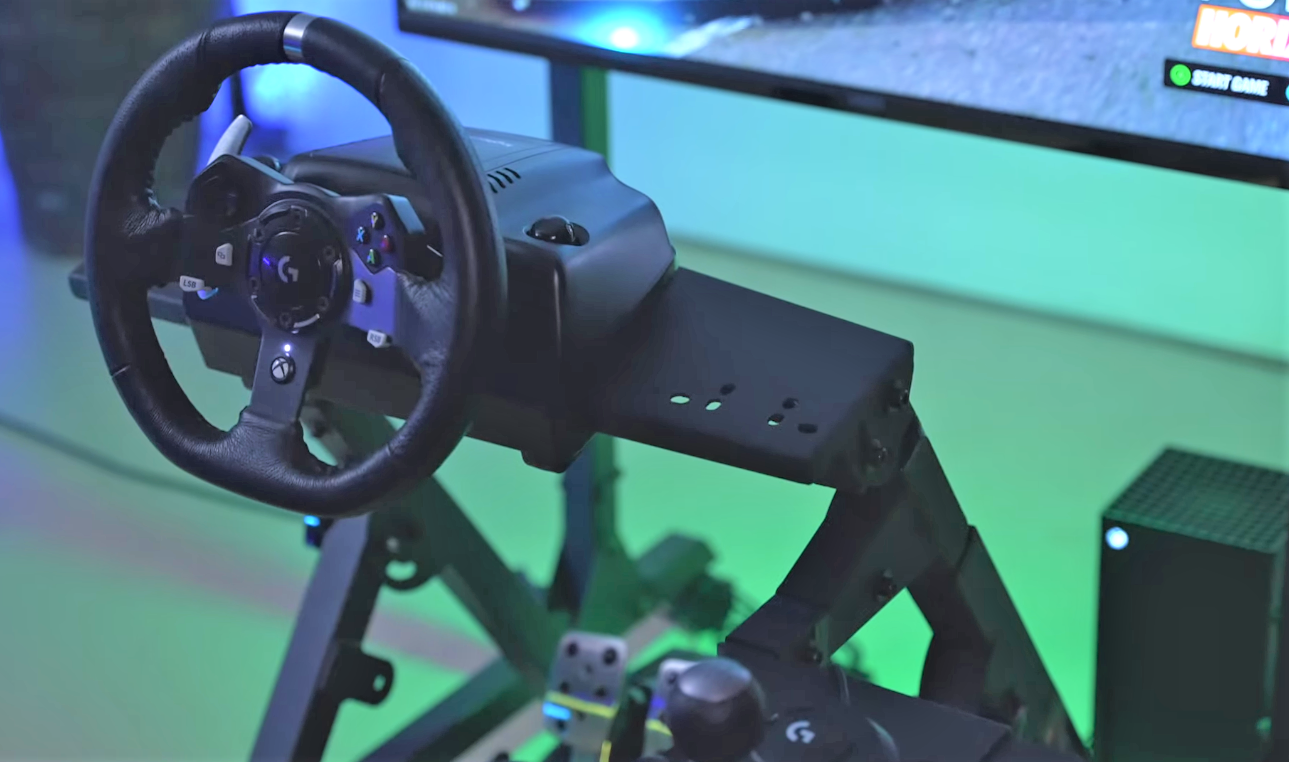
Performance with Direct Drive Wheels
The stand is marketed as being compatible with direct drive wheelbases up to 15Nm, with a strong recommendation for models like the Fanatec CSL DD (up to 8Nm). For a CSL DD with its 8Nm boost kit, the stand holds up remarkably well. While a small amount of lateral torsion can be induced during aggressive, high-speed corrections, it is minimal for a stand of this design and does not typically detract from the driving experience.
However, for users with more powerful direct drive systems (15Nm+), a full-profile aluminum cockpit would offer a higher degree of rigidity.
Foldability, Storage, and Upgrade Paths
For users with limited space, the stand’s ability to be folded down is one of its primary features.
Folding Mechanism for Compact Storage
The stand can be folded with most wheels and pedals still attached. By loosening key knobs, the main steering column and pedal assembly can be folded into a much smaller profile. The process is quick and allows the stand to be stored in a closet or corner, making it a practical solution for multi-use spaces. When folded, it requires a space of approximately 54 cm (W) x 35 cm (D) x 115 cm (H).
GTSeat Add-On: Upgrading to a Full Cockpit
The Wheel Stand 2.0 is designed as part of a modular ecosystem. It is fully compatible with the Next Level Racing GTSeat Add-on. This accessory directly attaches to the stand, transforming it from a standalone unit into a complete racing cockpit with an integrated sim racing seat. This provides a clear and cost-effective upgrade path for users who decide to transition to a more permanent setup in the future.
Frequently Asked Questions (FAQ)
Can the Next Level Racing Wheel Stand 2.0 be folded with the wheel and pedals attached?
Yes, the stand is designed to be folded with most standard-sized wheels, pedals, and shifters remaining mounted, which significantly speeds up setup and storage time.
How much flex is noticeable with a direct drive wheel like the Fanatec CSL DD?
With an 8Nm Fanatec CSL DD, there is very minimal flex or torsion, especially compared to other foldable stands. The robust carbon steel construction manages the torque well for a positive user experience. Users with wheelbases exceeding 10-12Nm may notice some movement but it remains highly usable.
Is the hardware for mounting Logitech, Thrustmaster, and Fanatec gear included?
Yes, the package includes the necessary bolts and washers to hard-mount the most popular wheels and pedals from these major brands right out of the box.
Does the Game Chair Cradle work with any office or gaming chair?
The cradle is designed to work with most standard 5-caster gaming and office chairs. By securing the front two wheels, it effectively prevents the chair from pushing back during braking.
What is the primary difference between the Wheel Stand 2.0 and the Wheel Stand DD?
The Wheel Stand DD is an even more robust model, engineered specifically for high-end, powerful direct drive wheels (15Nm+) and professional pedal sets. The Wheel Stand 2.0 is an excellent all-around solution that is more than capable for entry-level to mid-range direct drive systems, while the DD model is aimed at pro-level users demanding maximum rigidity.
Is it possible to mount a handbrake and a shifter at the same time?
Yes, the included mounting plate is large enough to accommodate many shifter and sim racing handbrake combinations simultaneously.

With a background in mechanical engineering and over a decade in competitive sim racing, Kenji serves as our lead Sim Racing Physics & Hardware Analyst. He deconstructs complex topics like force feedback and suspension geometry, helping readers understand the crucial engineering behind a perfect lap time. Kenji’s passion is to translate real-world motorsport principles into actionable knowledge for the sim racing community.
